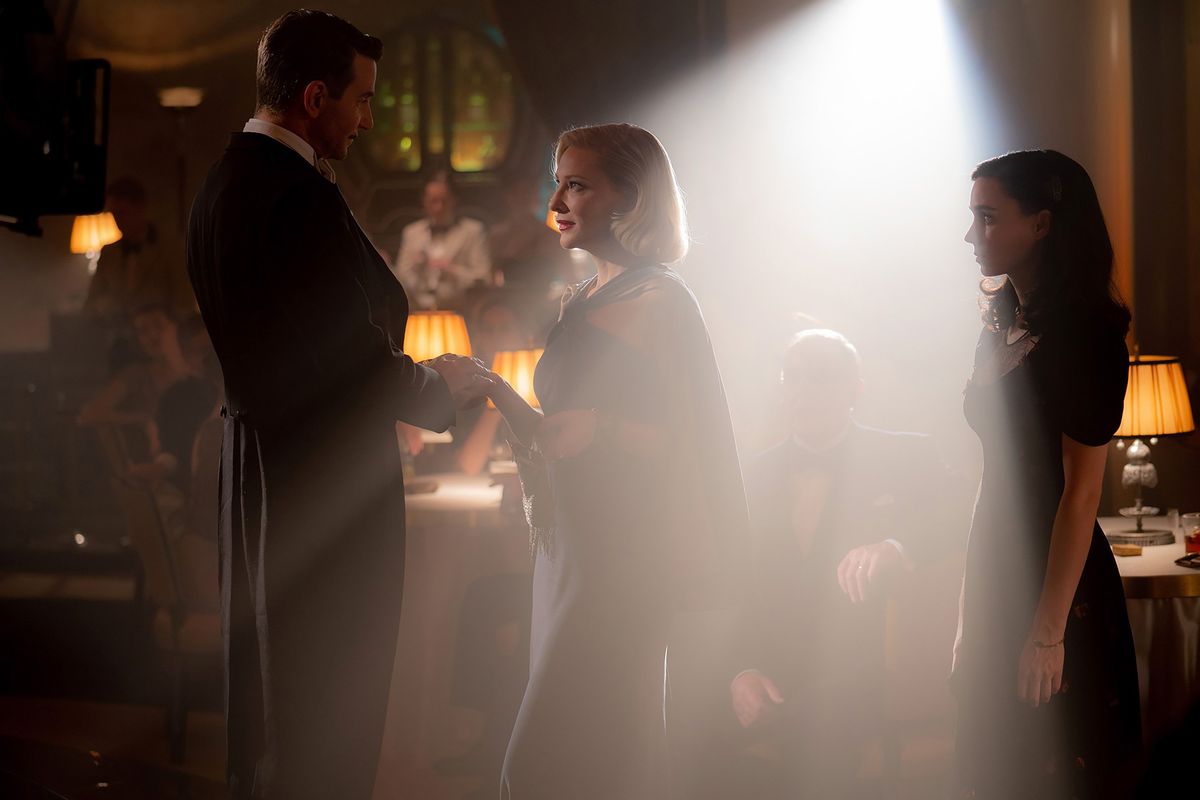Review: ‘Nightmare Alley’ is the rise and fall of a con man told in luscious, lurid detail

Based on William Lindsay Gresham’s 1946 novel about the rise and fall of a con man – previously adapted for the screen in 1947 – Guillermo del Toro’s noirish-to-the-point-of-misanthropic, gorgeously atmospheric “Nightmare Alley” may be the filmmaker’s best-looking film yet, as well as the one with the most sour outlook on humanity.
Every other outdoor scene seems staged in driving rain or gently falling snow, or under the kind of spooky sky that Ray Bradbury once described as “orange and ash gray at twilight” in the opening pages of his “Something Wicked This Way Comes.” Like “Nightmare,” Bradbury’s novel was also a story set in the colorful, creepy and menacing world of a traveling carnival and featuring a cast of outsiders, hustlers and freaks.
“Nightmare” begins in that world, against the backdrop of World War II, with the arrival of Stan Carlisle (Bradley Cooper), a handsome, charismatic drifter who parlays some quick manual labor for carnival boss Clem Hoatley (Willem Dafoe) into a regular job. Stan’s a quick study, and he’s soon picking up the tricks of the trade, particularly the mind-reading act of Zeena (Toni Collette) and her alcoholic husband Pete (David Strathairn).
But Stan’s too good for this world – or, rather, he’s too talented for it: Later, the protagonist makes a point of telling us he’s no good, and you’d do well to believe him. Eventually, Stan leaves for the big time with his new bride Molly (Rooney Mara), a fellow carny who becomes his assistant in a slick mentalist act they develop for the urbane audiences of a Chicago nightclub.
When Stan meets a seductive psychiatrist, Lilith Ritter (Cate Blanchett), his small cons give way to a big one. Together, Stan and Lilith – whose clientele includes a powerful, violent yet credulous mobster named Ezra Grindle (Richard Jenkins) – hatch a plan for Stan to pass himself off as a spiritualist medium. In this new grift, known in the parlance of the film as a “spook show,” Stan claims to be able to summon the dead: specifically the spirit of Ezra’s old mistress, who died after a botched abortion.
As the focus of the story shifts to their dangerous flimflam, “Nightmare Alley” loses a bit of steam. Cooper, Blanchett, Jenkins and Mara – whose character Stan enlists to play the dead girl – are uniformly excellent. (Molly is the film’s moral center in a story in which there are no real heroes.) But away from the carnival, you start to miss the almost pitiable charlatans, grifters and liars of that demimonde, replaced by villains of a more conventional – and hence more familiar – bent.
Nicely adapted from Gresham’s book by del Toro and Kim Morgan, “Nightmare” never wholly leaves behind the sordid milieu of the carnival. Even in its most sophisticated settings, it’s never very far away from what Clem calls the “nightmare alleys, train tracks and flophouses” in which he recruits drunks to play his “geeks”: sad, doomed losers who bite the heads off live chickens in front of shocked yet mesmerized carnival audiences just to be kept soused enough not to care.
“Nightmare Alley” is a cautionary tale, an allegory of ambition, hubris and despair. No matter how far Stan climbs up the ladder of high society, you know he’s going to fall. And, as with the geek, there’s a certain perverse satisfaction in watching him when he does. In something of a departure for del Torro, this is not a horror film or a story of the supernatural.
But it does have the filmmaker’s shocking, sometimes needlessly bloody DNA all over it. It’s a noir tale for contemporary audiences who have developed an appetite for sensation from comic book movies, not literature. The film doesn’t need all that spectacle, and it is at its best when it is at its simplest, relying on the power of storytelling and vivid language, not gory effects.
“Nightmare Alley” conjures a colorful world – a world of the “Odditorium” and the House of Damnation, as the carnival’s signs scream, in lurid reds and acid greens. But it is really, at its heart, an old-fashioned fable, a fairy tale for grown ups. “People will pay good money just to make themselves feel better,” Clem tells Stan, at one point, about the gullibility of his customers.
In the case of “Nightmare Alley,” you will – and you should – fork over the cost of a movie ticket just to make yourself feel bad.